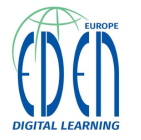Dear readers, a belated Happy New Year first of all. I hope all those who work in our field of distance and e-learning across Europe, and our friends further afield, have a prosperous and successful 2009. EDEN certainly hopes to contribute to that success through our support to you.
My New Year began with the ‘flu! As it did for many of my friends and colleagues. However things could only improve and soon did.
I was in late 2008 invited to join the ‘Commité Editorial’ of Distances et Savoirs, the French language journal in our field managed from CNED in France, and edited by Martine Vidal, Vice President of EDEN. In early January the journal held its annual Editorial Board meeting in Paris, and I attended for the first time. I met a group of some 15 colleagues, drawn primarily from France but with international members like myself from Norway, Switzerland and Belgium. The day was in the very best sense very French! The discussion was at a high intellectual level, evaluating the directions of open and distance learning, and the ways in which the journal could contribute to it. My experience of Editorial Boards elsewhere, including that of EDEN’s European Journal of Open, Distance and E-Learning (EURODL), is that the focus is much more dominated by immediate business, and less able to explore the context in which how the journal must develop. Distances et Savoirs performs a hugely valuable task in its commitment to the development of research and practice, and its dissemination in our field primarily through the French Language. Despite the use of English in so many European contexts we still live and work to a distressingly considerable extent in separate professional communities, divided by language. Who amongst us can really say we have good overall knowledge of the developments in our field in Germany, Norway, Spain and Sweden, as well as France and the UK, to take some leading examples. Many of us, too many of us in my view, remain isolated in Europe within our language communities and are not able to participate or avail ourselves of the wide range knowledge that exists across the European continent. This is particularly true of the British with our low level of language competence (I will say this before readers comment on it!). The French language of course defines communities in Canada, Africa and the Caribbean as well as in Europe, and the same arguments would apply there too. So Distances et Savoirs makes a tremendous contribution to Europe as a whole through its comment to our professional field in French.
My second January event was in a partnership of the Open University UK with the Universidade Aberta, the Open University of Portugal. Working with Vice-Rector Antonio Teixeira (a member of the EDEN Executive Committee), we ran a workshop on change management with the Deans and their equivalents in our two institutions. Change is of course a constant in all organisations, but the Universidade Aberta has over the last 3 years gone through a remarkable transformation in its adoption of innovative e-learning practices, and seen its student numbers rise. The Open University UK similarly has many challenges to face, both in its development of e-learning and in our rethinking of how a contemporary curriculum can best support current and future cohorts of students. The British group were received with great hospitality by our Portuguese colleagues in the beautiful headquarters building, the Palácio Ceia, in Lisbon, and our group of some 15 people spent a very fruitful 48 hours examining our own individual case studies for change, using a peer group of 3 or so colleagues to review, asses and advise on how to take them forward. This sort of bottom–up professional development is in my experience enormously rewarding, and working across different institutions and different cultures can be a really liberating experience, and I believe we all found it so.
The year’s work at the Open University UK has well and truly started, and we are, as so many must be across Europe, examining the implications of the financial recession on our University’s business over the next 3 or so years. Recession can drive individuals to flexible institutions such as those who use open and distance learning, as people lose their jobs or fell vulnerable in them, and need to build qualifications. A crisis in employment, so distressing for the individual, means that we have a huge responsibility to respond to their needs (readers might like to visit the ‘Outsmart the Recession’ pages at the OU UK website, which are intended to help visitors to the OU web presence who believe they are facing this problem.
Your EDEN Executive Committee meets early in February in Brussels, and will be discussing the ongoing preparation for our major meeting this year in June in Gdansk, Poland, on the theme of Innovation in Learning Communities. All you need to know about the conference can be found on the EDEN website, and I hope to see you there!
Best wishes for 2009!




